Here’s an excellent example of how Rich White Man Law works: Louisiana Supreme Court upholds Black man’s life sentence for trying to steal hedge clippers more than 20 years ago
Compare to Edmonton’s white – rich – convicted serial rapist, Matthew McKnight, getting kissed with 8 years in jail, likely out in 2, by white judge Sulyma.
Emmett Macfarlane@EmmMacfarlane Poli Sci Prof, UWaterloo. Constitutional Law, Public Policy & Cdn Politics. Author & editor of books.
Law is politics people. Never forget.
Canada’s top judge history (are/were any poor, living without water?):
All Supreme Court of Canada appointments to date:
87 White men
10 White women
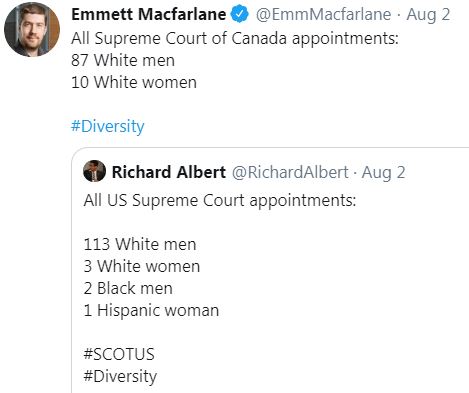
Richard Albert@RichardAlbert
Proud Flag of Canada, Professor of World Constitutions@UTexasLaw, Alum@OCDSB, @OrleansBengals, @Yale, @Harvard, @UniofOxford, Tweets are my reading list
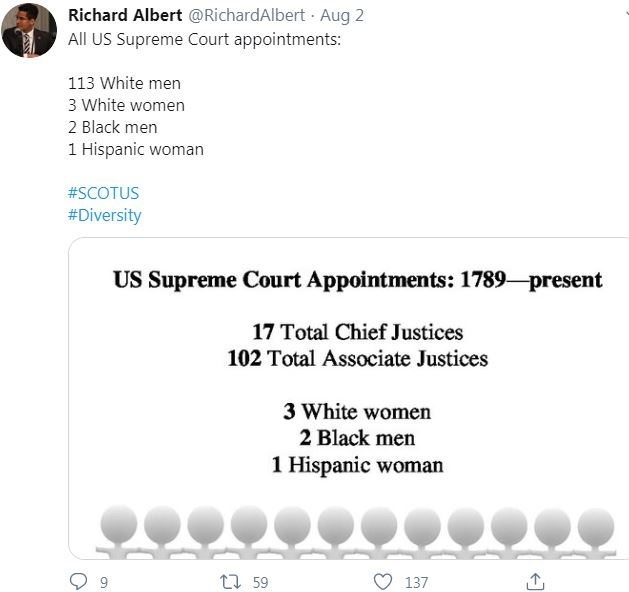
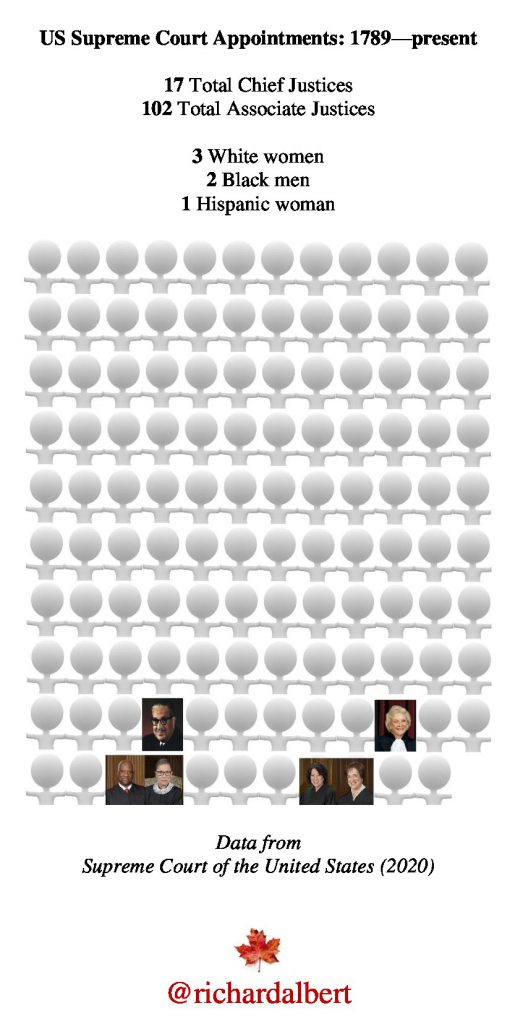
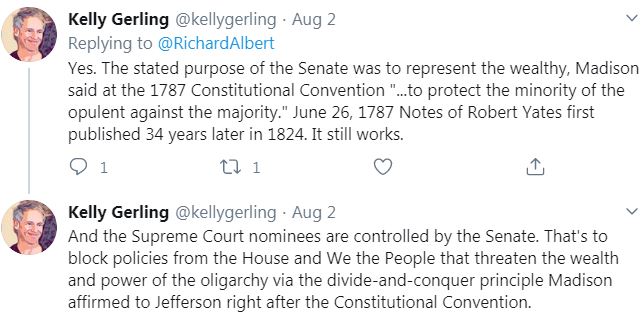
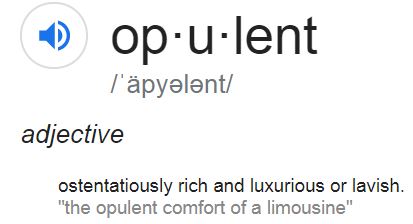
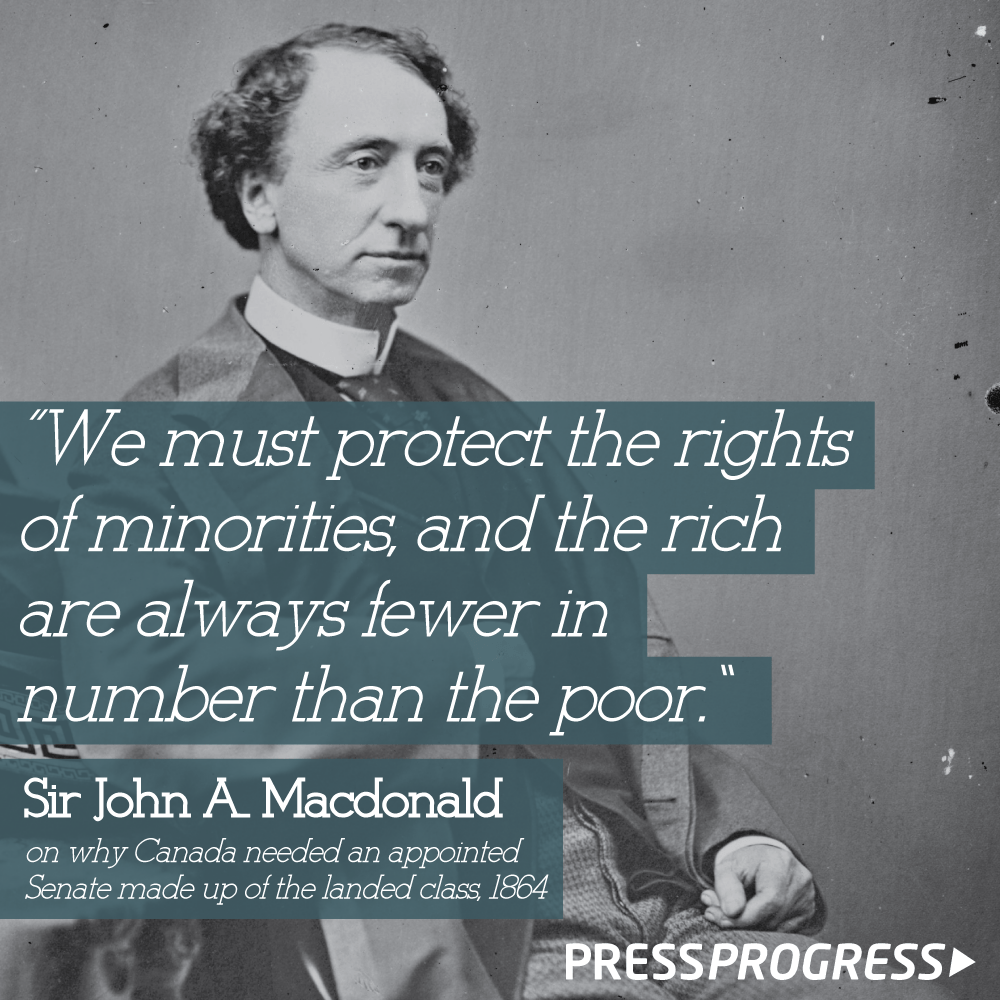

Term of the Senate, [26 June] 1787
Mr. Madison. In order to judge of the form to be given to this institution, it will be proper to take a view of the ends to be served by it. These were first to protect the people agst. their rulers: secondly to protect the people agst. the transient impressions into which they themselves might be led. A people deliberating in a temperate moment, and with the experience of other nations before them, on the plan of Govt. most likely to secure their happiness, would first be aware, that those chargd. with the public happiness, might betray their trust. An obvious precaution agst. this danger wd. be to divide the trust between different bodies of men, who might watch & check each other. In this they wd. be governed by the same prudence which has prevailed in organizing the subordinate departments of Govt., where all business liable to abuses is made to pass thro’ separate hands, the one being a check on the other. It wd. next occur to such a people, that they themselves were liable to temporary errors, thro’ want of information as to their true interest, and that men chosen for a short term, & employed but a small portion of that in public affairs, might err from the same cause. This reflection wd. naturally suggest that the Govt. be so constituted, as that one of its branches might have an oppy. of acquiring a competent knowledge of the public interests. Another reflection equally becoming a people on such an occasion, wd. be that they themselves, as well as a numerous body of Representatives, were liable to err also, from fickleness and passion. A necessary fence agst. this danger would be to select a portion of enlightened citizens, whose limited number, and firmness might seasonably interpose agst. impetuous counsels. It ought finally to occur to a people deliberating on a Govt. for themselves, that as different interests necessarily result from the liberty meant to be secured, the major interest might under sudden impulses be tempted to commit injustice on the minority. In all civilized Countries the people fall into different classes havg. a real or supposed difference of interests. There will be creditors & debtors, farmers, merchts. & manufacturers. There will be particularly the distinction of rich & poor. It was true as had been observd. (by Mr. Pinkney) we had not among us those hereditary distinctions, of rank which were a great source of the contests in the ancient Govts. as well as the modern States of Europe, nor those extremes of wealth or poverty which characterize the latter. We cannot however be regarded even at this time, as one homogeneous mass, in which every thing that affects a part will affect in the same manner the whole. In framing a system which we wish to last for ages, we shd. not lose sight of the changes which ages will produce. An increase of population will of necessity increase the proportion of those who will labour under all the hardships of life, & secretly sigh for a more equal distribution of its blessings. These may in time outnumber those who are placed above the feelings of indigence. According to the equal laws of suffrage, the power will slide into the hands of the former. No agrarian attempts have yet been made in this Country, but symtoms, of a leveling spirit, as we have understood, have sufficiently appeared in a certain quarters to give notice of the future danger. How is this danger to be guarded agst. on republican principles? How is the danger in all cases of interested coalitions to oppress the minority to be guarded agst.? Among other means by the establishment of a body in the Govt. sufficiently respectable for its wisdom & virtue, to aid on such emergences, the preponderance of justice by throwing its weight into that scale. Such being the objects of the second branch in the proposed Govt. he thought a considerable duration ought to be given to it. He did not conceive that the term of nine years could threaten any real danger; but in pursuing his particular ideas on the subject, he should require that the long term allowed to the 2d. branch should not commence till such a period of life, as would render a perpetual disqualification to be re-elected little inconvenient either in a public or private view. He observed that as it was more than probable we were now digesting a plan which in its operation wd. decide for ever the fate of Republican Govt. we ought not only to provide every guard to liberty that its preservation cd. require, but be equally careful to supply the defects which our own experience had particularly pointed out.1
Ms (DLC).
1. Yates’s version:
“Mr Madison. We are now to determine whether the republican form shall be the basis of our government—I admit there is weight in the objection of the gentleman from South Carolina; but no plan can steer clear of objections. That great powers are to be given, there is no doubt; and that those powers may be abused is equally true. It is also probable that members may lose their attachments to the states which sent them—Yet the first branch will control them in many of their abuses. But we are now forming a body on whose wisdom we mean to rely, and their permanency in office secures a proper field in which they may exert their firmness and knowledge. Democratic communities may be unsteady, and be led to action by the impulse of the moment. Like individuals they may be sensible of their own weakness, and may desire the counsels and checks of friends to guard them against the turbulency and weakness of unruly passions. Such are the various pursuits of this life, that in all civilized countries, the interest of a community will be divided. There will be debtors and creditors, and an unequal possession of property, and hence arises different views and different objects in government. This indeed is the ground-work of aristocracy; and we find it blended in every government, both ancient and modern. Even where titles have survived property, we discover the noble beggar haughty and assuming.
“The man who is possessed of wealth, who lolls on his sofa or rolls in his carriage, cannot judge of the wants or feelings of the day laborer. The government we mean to erect is intended to last for ages. The landed interest, at present, is prevalent; but in process of time, when we approximate to the states and kingdoms of Europe; when the number of landholders shall be comparatively small, through the various means of trade and manufactures, will not the landed interest be overbalanced in future elections, and unless wisely provided against, what will become of your government? In England, at this day, if elections were open to all classes of people, the property of the landed proprietors would be insecure. An agrarian law would soon take place. If these observations be just, our government ought to secure the permanent interests of the country against innovation. Landholders ought to have a share in the government, to support these invaluable interests and to balance and check the other. They ought to be so constituted as to protect the minority of the opulent against the majority. The senate, therefore, ought to be this body; and to answer these purposes, they ought to have permanency and stability. Various have been the propositions; but my opinion is, the longer they continue in office, the better will these views be answered” (Farrand, Records, I, 430–31).
Lansing’s version:
“Madison—The Advantages of Government cannot be extended equally to all—Those remote from Seat of Government cannot be placed in a Situation equally advantageous with such as near it—Distinctions will always exist—that of Debtor and Creditor—Property had made Distinctions in Europe before a Nobility was created—Inequality of Property will produce the same Distinctions here—The Man in affluent Circumstances has different Feelings from the man who daily toils for a Subsistence. The landed Interest has now the Supreme Power—a Century hence the commercial may prevail—The Government ought to be so organized as to give a Ballance to it and protect one Order of Men from the predominating Influence of the other. The Senate ought to represent the opulent Minority—If this is not done the System cannot be durable” (Strayer, Delegate from N.Y., p. 84).
Note: The annotations to this document, and any other modern editorial content, are copyright © University of Chicago Press. All rights reserved.

Refer also to:
“We have wonderful justice for corporations and for the wealthy. But the middle class and the poor may not be able to access our justice system.”
– Chief Justice Beverley McLachlin, University of Toronto conference, 2011 (File since removed, typical.)
2009: Canada’s top judge says justice often blocked
[Chief Justice Beverley McLachlin of the Supreme Court of Canada] says there are more and more people who are being hindered by barriers such as cost, delay and complex procedures.
“A court system where some ride to justice in a Ferrari while others don’t get out of the garage falls short of the ideal of justice for all,”
![]() Ernst’s lawsuit stagnated, parked in the garage for years, decimating her savings. Now, with her lawyers betraying her and the public interest (our drinking water) by abruptly quitting – even when apparently such destructive legal behaviour is contrary to Law Society Rules – Ernst, her dangerously contaminated drinking water and lawsuit is under the garage while ex lawyers Murray Klippenstein and Cory Wanless cowardly and pathetically refuse to return her files to her. Where are the legal industry regulators/authorities? Oh right, there are none.
Ernst’s lawsuit stagnated, parked in the garage for years, decimating her savings. Now, with her lawyers betraying her and the public interest (our drinking water) by abruptly quitting – even when apparently such destructive legal behaviour is contrary to Law Society Rules – Ernst, her dangerously contaminated drinking water and lawsuit is under the garage while ex lawyers Murray Klippenstein and Cory Wanless cowardly and pathetically refuse to return her files to her. Where are the legal industry regulators/authorities? Oh right, there are none.![]()
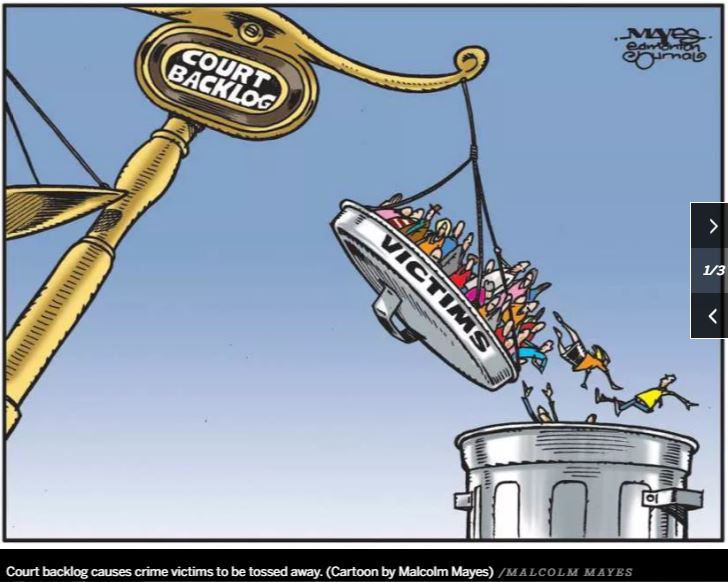
Intentional backlog created by politicians intentionally not filling vacancies on the benches across Canada to intentionally set-up Supreme Court with their Jordan ruling?
Has anything become more “just” or fair or less bankrupting in the American and Canadian judicial industries? No. They’ve become more and more inaccessible for ordinary harmed citizens, with costs going up up up up up, and ever more time wasting (and not necessary) complicated proceedures added to launder more money from the harmed into rich pockets while rapists, pedophiles, murderers (as long as they are male, white and privileged from “good families”) get off or kissed by judges with gallingly reduced sentences.![]()
